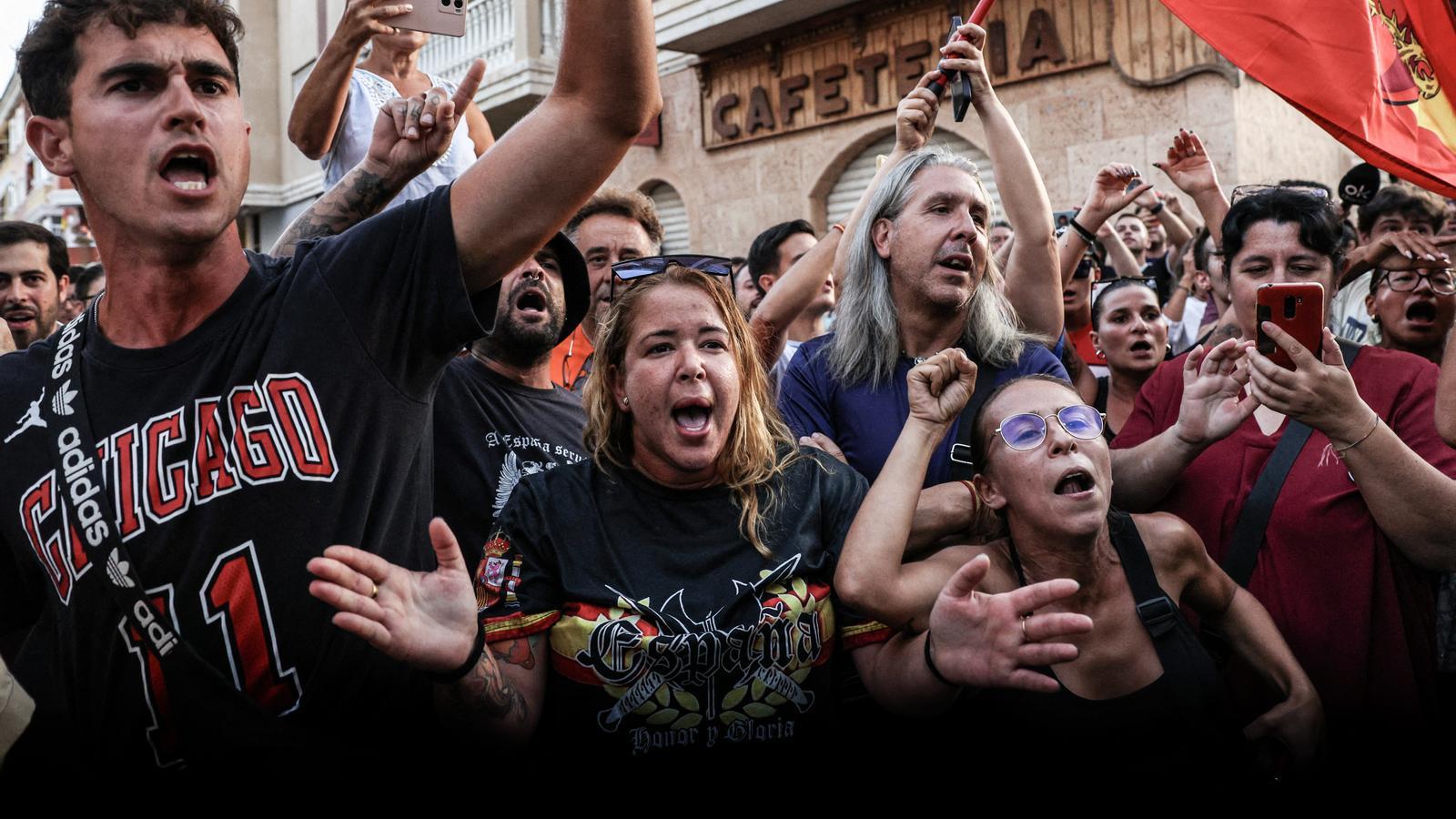Torre Pacheco, the laboratory of the far right
Vox is the main beneficiary of an episode that demonstrates the strength of the ultras on social media.


Barcelona"What we've seen in Torre Pacheco is the crystallization of everything that has been brewing on social media over the last eight years in terms of hate speech. It's, on a small scale, like the assault on the Capitol, the transition from online to offline." This is how journalist and social media consultant Carmela Ríos puts it, believing that Torre Pacheco has seen a turning point in the actions of the far right, which has demonstrated both a strong capacity to rally and set the agenda based on an isolated incident.
Let us remember that the case of this Murcian town begins when a 68-year-old resident, Domingo Tomás Martínez, explained to the newspaper The truth On the 9th, who three days earlier had been the victim of an indiscriminate attack by a young man of foreign origin (at this point, three people have been arrested for the attack). The following day, the Vox spokesperson in the town, José Garre, posted a tweet with a video of an attack on an elderly man with the caption: "This is how they spread terror in Torre Pacheco among those of the religion of peace." But the video does not correspond to the attack in Torre Pacheco, as the person in the picture would later clarify, and had been carried out by young Spaniards. It doesn't matter now, because the tweet spreads like wildfire.
Then Telegram groups from groups like Deport Them Now sprang into action, calling for "Moors to be hunted down," and extremist organizations like Desokupa called for demonstrations. Consultant and networking expert Xavier Tomàs explains that Telegram is ideal for these groups because they allow people to connect by interest. "If you're a young person from a town in Murcia and you're interested in what's happening in Torre Pacheco, on Telegram you can quickly join groups with anti-immigration content." During the protests in the city, a sixteen-year-old boy with a Basque mother and a Moroccan father was beaten by the crowd. They also attacked a kebab shop. In response to the young people who are Spanish but have Moroccan roots, they also organized to defend themselves. Conflict is brewing.
Ultras and influencers
Torre Pacheco, a city of 40,000 inhabitants, with 17% of the population of North African origin, a crime rate in line with the Spanish average, and a 26% vote for Vox in 2023, has thus become a kind of laboratory for the far right in recent days. On the ground, extremists have been seen, as well as agitators posing as journalists, i.e. influencers far-right. ARA journalist Albert Limós witnessed how they operate and explains it himself this way: "I'm the only journalist." This was repeated over and over again by Adrián Rescue Me, one of the media agitators with tens of thousands of followers on social media, during his live broadcast in Torre Pacheco, while he was chasing a TVE journalist whom he was chasing and insulting. These fake journalists don't act as such; rather, they lead the demonstration and even act as pseudo-official spokespersons. They are part of the far-right communication machinery. Other well-known names who were also in Torre Pacheco include Bertrand Ndongo, Vito Quiles, and David Santos.
This is perhaps the biggest difference between the far-right rallies of the 1980s and 1990s. Now these groups have their own media coverage, which not only serves to disseminate their content but also to call for participation. The other big difference is that now there is a party, Vox, that provides political coverage for these speeches and directly reaps the rewards of this agitation. For historian Xavier Casals, there is no doubt that the Torre Pacheco case has served Vox to shake up the political landscape. "Note that it all begins with Rocío de Meer's statements about deporting eight million people, and with Torre Pacheco, Vox manages to position its anti-immigration agenda at a time when everything was bipartisan, that is, the problems of the PSOE and the PP Congress." Rocío de Meer, incidentally, is the niece of Santiago Abascal's main ideological advisor, Kiko Monasterio, and, as Macarena Olona explained, she aspires to one day replace the current leader.
For Casals, the events in Torre Pacheco could bear some similarity to what was called "National November," the demonstrations held outside the PSOE headquarters in Ferraz to protest against Pedro Sánchez's investiture agreement and the amnesty. It was never clear whether they were directly instigated by Vox or not, but it was they who appropriated them. "What comes first, the chicken or the egg?" Casals asks.
The CIS shoots Vox
The Torre Pacheco outburst also coincided with a CIS poll that boosted Vox's voting intention to 18.9%, a 5.7-point increase in a single month. With that percentage, Vox would have over 60 seats. "The combination of Torre Pacheco and the Montoro case has radically changed the political landscape and left the PP out of the game," Casals notes. The historian believes that "the PP has not yet found a formula for coexistence with Vox; for them, they are an ally/enemy."
And what should be done from here to stop the rise of the far right? Both Carmela Ríos and Xavier Tomàs point to the laxity of European regulations, which allows such xenophobic and criminal content to spread unchecked throughout the continent. Ríos also points to the responsibility of judges, who are responsible for sentencing hate crimes. And Tomàs is especially critical of the limited use of social media by other political parties. "The far right has won this battle due to the non-appearance of the rest," he notes. "In the last 24 hours, Vox Catalunya has made five videos. In the metropolitan area, they have dedicated social media teams and they're the ones who spend the most money on Facebook and Instagram," Casals points out. "On the other hand, Pedro Sánchez doesn't even have TikTok. How is it that no one is creating content to debunk the relationship between immigration and crime?" he laments in frustration.
